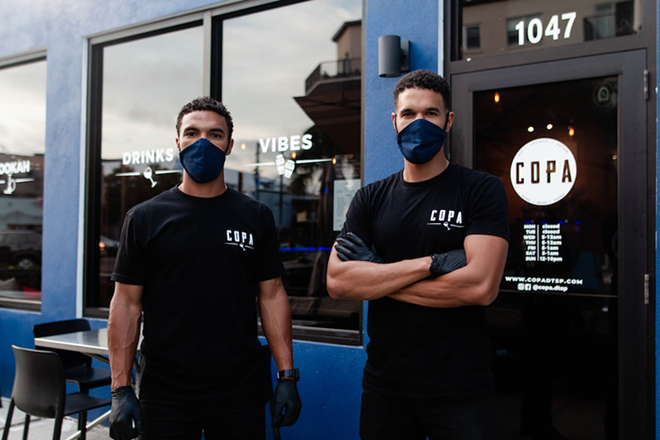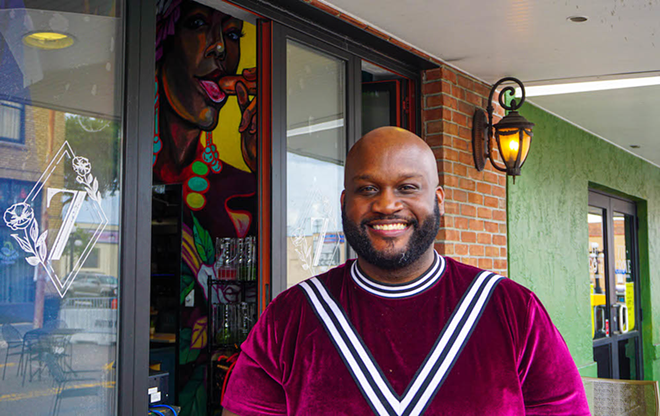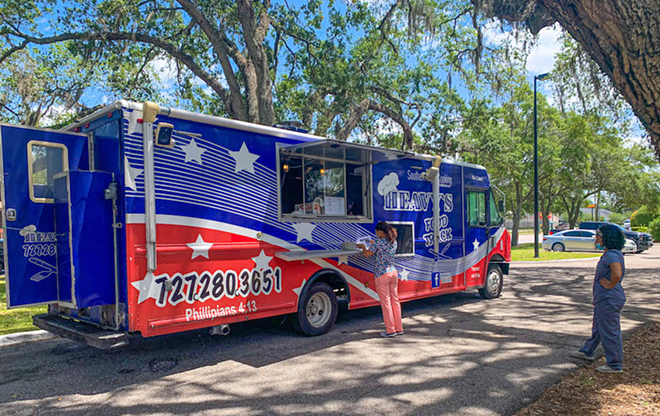Tampa Bay’s restaurant industry is adapting to an unprecedented pandemic that’s changed the landscape forever in just two months. Tampa Bay’s Black-owned restaurants were no exception, and a few are coping with the coronavirus by thinking of innovative ideas to keep their loyal customers interested.
“All the big cities started to get hit first so I was hoping it wasn’t going to come to the smaller cities,” Maxim Thurière, co-owner of Downtown St. Petersburg’s Copa (stylized “COPA”), tells Creative Loafing Tampa Bay.
Once it was clear the state would be affected, he realized the restaurant would have to close at some point. Maxim and his brother, co-owner Sébastien Thurière, are relatively new to the hip restaurant scene in St. Petersburg after opening Copa Lounge—located at 1047 Central Ave. in St. Pete’s Edge District—less than a year ago. Because of his degree in biomedical science, Thurière could explain exactly what the pandemic was and what it meant for Copa and its employees.
“We closed and focused on some other stuff for a month. It’ll give us a chance to take a step back and look at everything we were doing like repairs, renovations, and improve,” Thuriére explained.
Heavy’s Food Truck co-owner Kendrick Scott was planning to open a brick and mortar location of his restaurant when everything happened. The bulk of Heavy’s revenue comes from various catered events so he’s anticipating the country reopening to 100% capacity. He says they’re making it these days by parking on different street corners selling food to those driving by.
“Between March 14-April 3, we lost $40,000 in revenue with canceled catering because everyone was shutting down,” Scott says, but he didn’t shut down because he needed to keep a revenue stream for his employees.
“I’ve been selfless for a long time and I was thinking about my guys. I said to myself I had to keep this thing rolling because they have families to feed and bills to pay,” he says.
In addition to figuring out how to survive, owners look for any type of financial assistance they can apply for to pay employees and keep the lights on. Former State Representative Edwin Narain says Black-owned restaurants usually have at least two weeks’ worth of funds in the bank, so when times get bad, everyone’s affected.
“The average Black or brown business has about 14 days’ worth of cash on hand. Two bad weeks can cause one of those businesses to go under,” Former State Representative Edwin Narain tells CL.
Ybor City restaurant 7th+Grove, located at 1930 E. 7th Ave. in Ybor City, is one of the fortunate restaurants to be approved for PPP funding from the federal government. Co-owner and Creative Director Dr. Jamaris Glenn tells CL it received funds in the 5- to 6-figure range.
“It allows us to hire back more of our employees and use a percentage of the funds for utilities like our rent,” Glenn explains.
He says some employees are opting not to come back because with limited occupancy they won’t receive enough take-home pay to cover their personal expenses. By receiving unemployment pay, those employees can focus on other interests and pay their bills.
7th+Grove is in a sweet spot within Ybor City through the City of Tampa’s recently launched Lift Up Local Economic Recovery Plan. Over the span of two weeks, local restaurants and businesses in various parts of the city can open their doors to limited occupancy with outdoor seating along sidewalks and closed streets. According to the plan, Seventh Avenue is shut down from 15th to 21st Streets, allowing for the area’s bars and shops to operate with a few social distancing rules in place. Although he’s in favor of the street closure, Glenn says some oppose it.
“I thought it was a really great idea. People walk down Seventh with a mission to come and eat somewhere,” says Glenn.
COPA is another recipient of assistance, not from the federal government but locally. Thurière says they received a $5,000 grant from the City of St. Petersburg.
“Although it’s nice to have $5,000, the expense to keep the restaurant open is 10 times as much. We’re appreciative, but we’ve had to take other steps to prepare for this,” says Thurière.
In order to drum up more support for restaurants to keep them running, Narain and his wife Monica, along with friends Stevonia Dixon, Sammecia Bagley, Belinthia Berry, Felicia Harvey, Anddrikk Frazier, and Cedric McCray, created the “Saturday To-Go” initiative in April to highlight minority-owned businesses in Tampa. The grassroots program encourages Tampa residents via social media to order to-go meals to help generate sales and save employment. It started with only seven restaurants participating the first week. Once word got out about “Saturday To-Go”, the number of restaurants quickly grew to about 15.
“The goal is to improve the awareness of the Black and brown restaurants. People go to the same restaurants to support when these minority-owned restaurants are established, safe, offer good food, and are unknown,” Narain says.
The City of Tampa partnered with the Narains recently to help promote “Saturday To-Go” as part of the Lift Up Local Economic Recovery Plan. Restaurants join for free as long as they practice social distancing and health guidelines. Residents show off their meals using the hashtag #SaturdayToGo. Narain says one business reported a 50% increase by midday on the first Saturday of the initiative.
“We’re going to go as long as it takes. Every week, we’ll keep posting about restaurants in the neighborhood and patronize them,” he adds. Various problems with food vendors from shutting down to increasing the prices of food or items being on backorder caused some issues with restaurants receiving some of their essential products from food to paper products.

“[Our distributor was] short-staffed and it was even hard for them to even get a surplus of supplies from chicken to paper towels,” says Calvin Jefferson, co-owner of Mr. B’s Restaurant located at 3401 N. Nebraska Ave. in Ybor Heights.
Fortunately for Jefferson, this didn’t cause any issues with his menu. There were days where the restaurant ran out of some food, but staff kept searching until it could replace the items.
“You can count on one hand the number of places we didn’t go. That’s how much footwork was going on,” mentions Roderick Johnson, restaurant manager at Mr. B’s.
With a lot more time on their hands these days, owners are seizing any opportunity to get a bit creative to keep customers engaged and interested. Jefferson found himself perfecting old recipes and testing new ones like waffle burgers and pancake breakfast sandwiches.
“I’m trying to get him to incorporate spaghetti on the menu. He makes an awesome homemade sauce,” Johnson says.
Thurière says Copa switched to having only two tables available inside for reservations to prevent anyone being exposed. Ample outdoor seating, also available for reservation, follows strict social distancing rules.
“Safety first. I want people to come here and have a good time. I don’t want to be on the other end where people are crammed together. Worst case scenario is we have to close down again because people aren’t obliging by the rules,” he says.
A new thing Thurière mentions they’re trying with customers are Virtual Wine Tastings. He says the new venture went better than what he and his brother expected. Participants can choose between picking up the bottles themselves or delivery. The tastings helped cover rent and other expenses plus they were so successful, more wine tastings are planned for the future.
“We’d all jump on a Zoom call and a wine sommelier explains each wine and what foods to pair. Some nights we’d have 25 people participating,” Thurière explains.
Helping out residents and giving back to the community is also part of making sure we all get through this coronavirus safely.
Jefferson and his employees at Mr. B’s constantly serve essential frontline workers, including nurses and EMTs, whenever they can. Scott says a few local organizations and businesses paid for a number of Heavy’s Food Truck meals for residents in Hillsborough and Pinellas Counties.
“We’re known in the area, so a lot of people give us a call because they know we do things like this. They determine the location, I post it on Facebook and people come,” Scott explains.
The Jameis Winston Foundation partnered with a few Black- owned restaurants in the area in May to create dinners for those in need through its “Nourishing Our Community” initiative. Glenn says he’s forever grateful 7th+Grove was one of the restaurants chosen.
“I thought that was the most amazing thing ever. I’m just floored by that. That’s love,” says Glenn.
As the owners welcome customers back inside, extra precautions are in place to assure adherence to CDC and state guidelines. When guests arrive, they’ll see employees wearing masks and gloves whether serving or cooking food. Tables are sanitized around the clock from open to close to ensure cleanliness. Customers can feel confident seeing signs posted around detailing the steps restaurants are taking to keep them safe and well in the pandemic.
“We have marks on the floor showing where you can stand and sanitizing stations for employees and customers to use. We sanitize every hour on the hour,” says Jefferson.
As for the future, the owners remain confident Black-owned restaurants will come out of the pandemic stronger than before, having adapted to a “new normal”. Narain says Black- owned restaurants will survive, but people choosing to spend their dollars at those establishments is what makes a difference.
“In the history of our people, when times were tight, we pulled together and figured out a way to survive. I predict we’ll look back on this in a decade and remember we survived it,” says Narain.
Support local journalism in these crazy days. Our small but mighty team is working tirelessly to bring you up to the minute news on how Coronavirus is affecting Tampa and surrounding areas. Please consider making a one time or monthly donation to help support our staff. Every little bit helps.
Want to know everything going on with Tampa Bay's food and drink scene? Sign up for our Bites newsletter.




